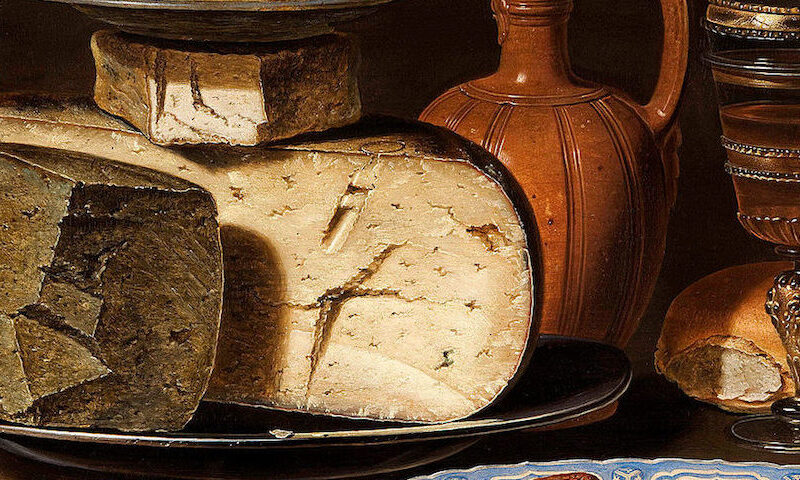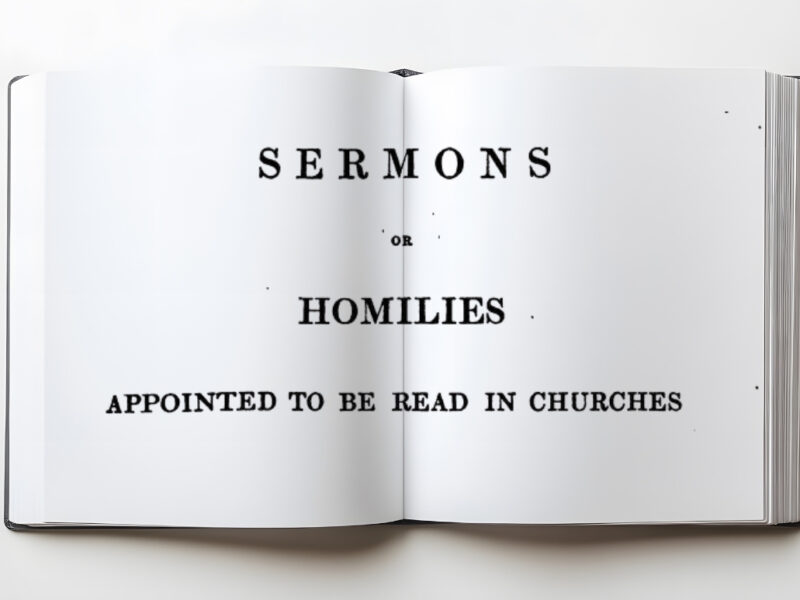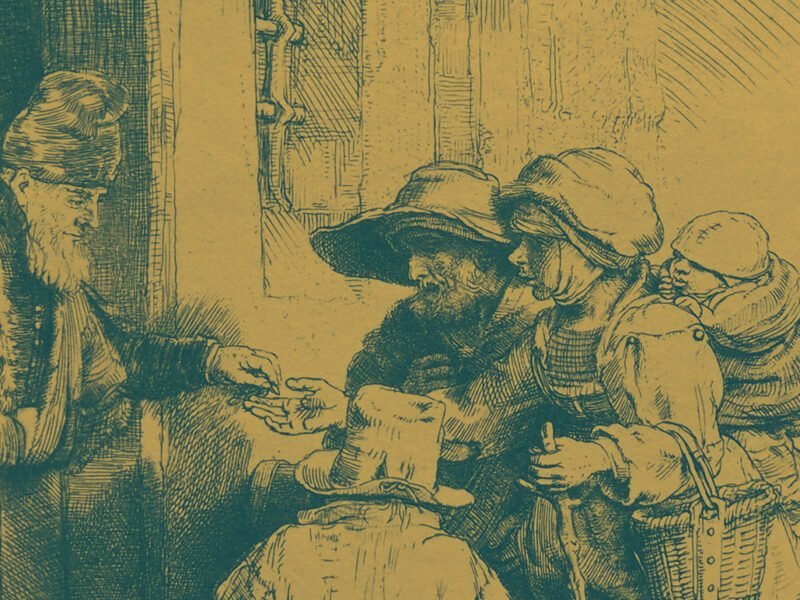The Second Part of the Homily of the Place and Time of Prayer
It hath been declared unto you, good Christian people, in the former Sermon read unto you, at what time and into what place ye shall come together to praise God. Now I entend to set before your eyes, first, how zealous and desirous ye ought to be to come to your church, secondly, how sore God is grieved with them that do despise or little regard to come to the church upon the holy restful day.
It may well appear by the Scriptures[1], that many of the godly Israelites, being now in captivity for their sins among the Babylonians, full often wished and desired to be again at Hierusalem. And at their return through God’s goodness, though many of the people were negligent, yet the fathers[2] were marvellous devout to build up the temple, that God’s people might repair thither to honour him. And King David, when he was a banished man out of his country, out of Hierusalem the holy city, from the sanctuary, from the holy place, and from the tabernacle of God, what desire, what ferventness was in him towards that holy place! what wishings and prayers made he to God to be a dweller in the house of the Lord! One thing saith he, have I asked of the Lord and this will I still crave, that I may resort and have my dwelling in the house of the Lord so long as I live.[3] Again, O how I joyed when I heard those words, We shall go into the Lord’s house.[4] And in other places of the Psalms he declareth for what entent and purpose he hath such a fervent desire to enter into the temple and church of the Lord. I fall down, saith he, and worship, in the holy temple of the Lord. Again, I have appeared in thy holy place, that I might behold thy might and power, that I might behold thy glory and magnificence.[5] Finally, he saith, I will shew forth thy Name to my brethren, I will praise thee in the middles of the congregation.[6] Why then had David such an earnest desire to the house of God? First, because there he would worship and honour God. Secondly, there he would have a contemplation and a sight of the power and glory of God. Thirdly, there he would praise the Name of God with all the congregation and company of the people. These considerations of this blessed Prophet of God ought to stir up and kindle in us the like earnest desire to resort to the church, especially upon the holy restful days; there to do our duties and to serve God; there to call to remembrance how God, even of his mere mercy and for the glory of his Name sake, worketh mightily to conserve us in health and wealth and godliness, and mightily preserveth us from the assaults and rages of our fierce and cruel enemies; and there joyfully in the number of his faithful people to praise and magnify the Lord’s holy Name. Set before your eyes also that ancient father Simeon, of whom the Scripture speaketh thus, to his great commendation and an encouragement for us to do the like. There was a man at Hierusalem, named Simeon, a just man, fearing God: he came by the Spirit of God into the temple, and was told by the same Spirit, that he should not die before he saw the Anointed of the Lord. [7] In the temple his promise was fulfilled; in the temple he saw Christ, and took him in his arms; in the temple he brast out into the mighty praise of God his Lord. Anna also, a prophetess, an old widow, departed not out of the temple giving herself to prayer and fasting day and night: and she, coming about the same time, was likewise inspired, and confessed and spake of the Lord to all them who looked for the redemption of Israel. This blessed man and blessed woman were not disappointed of wonderful fruit, commodity, and comfort which God sent them by their diligent resorting to God’s holy temple.
Now ye shall hear how grievously God hath been offended with his people, for that they passed so little upon his holy temple, and foully either despised or abused the same. Which thing may plainly appear by the notable plagues and punishments which God hath laid upon his people, especially in this, that he stirred up their adversaries horribly to beat down, and utterly to destroy, his holy temple with a perpetual desolation. Alas, how many churches, countries, and kingdoms of Christian people have of late years been plucked down, overrun, and left waste, with grievous and intolerable tyranny and cruelty of the enemy of our Lord Christ, the great Turk, who hath so universally scourged the Christians, that never the like was heard or read of! Above thirty years past the great Turk had overrun, conquered, and brought into his dominion and subjection twenty Christian kingdoms, turning away the people from the faith of Christ, poisoning them with the devilish religion of wicked Mahomet, and either destroying their churches utterly, or filthily abusing them with their wicked and detestable errors. And now this great Turk, this bitter and sharp scourge of God’s vengeance, is even at hand in this part of Christendom, in Europe, at the borders of Italy, at the borders of Germany, greedily gaping to devour us, to overrun our country, to destroy our churches also, unless we repent our sinful life, and resort more diligently to the church to honour God, to learn his blessed will, and to fulfil the same.
The Jews in their time provoked justly the vengeance of God, for that partly they abused his holy temple with the detestable idolatry of the heathen, and superstitious vanities of their own inventions, contrary to God’s commandment; partly they resorted unto it as hypocrites, spotted, imbrued, and foully defiled with all kind of wickedness and sinful life; partly many of them passed little upon the holy temple, and forced not whether they came thither or no. And have not the Christians of late days, and even in our days also, in like manner provoked the displeasure and indignation of Almighty God, partly, because they have profaned and defiled their churches with heathenish and Jewish abuses, with images and idols, with numbers of altars too too superstitiously and intolerably abused, with gross abusing and filthy corrupting of the Lord’s holy Supper, the blessed Sacrament of his Body and Blood, with an infinite number of toys and trifles of their own devices, to make a goodly outward shew, and to deface the homely, simple, and sincere religion of Christ Jesus? Partly, they resort to the church like hypocrites, full of all iniquity and sinful life, having a vain and a dangerous fancy and persuasion, that if they come to the church, besprinkle them with holy water, hear a mass, and be blessed with the chalice though they understand not one word of the whole service, nor feel one motion of repentance in their hearts, all is well, all is sure. Fie upon such mocking and blaspheming of God’s holy ordinance. Churches were made for another purpose, that is, to resort thither and to serve God truly, there to learn his blessed will, there to call upon his mighty Name, there to use the holy Sacraments, there to travail how to be in charity with thy neighbour, there to have thy poor and needy neighbour in remembrance, from thence to depart better and more godly than thou earnest thither. Finally, God’s vengeance hath been and is daily provoked, because much wicked people pass nothing to resort to the church, either for that they are so sore blinded, that they understand nothing of God and godliness, and care not with devilish example to offend their neighbours; or else for that they see the church altogether scoured of such gay gazing sights as their gross fantasy was greatly delighted with, because they see the false religion abandoned and the true restored, which seemeth an unsavoury thing to their unsavoury taste; as may appear by this, that a woman said to her neighbour, Alas, gossip, what shall we now do at church, since all the saints are taken away, since all the goodly sights we were wont to have are gone, since we cannot hear the like piping, singing, chanting, and playing upon the organs, that we could before? But, dearly beloved, we ought greatly to rejoice and give God thanks, that our churches are delivered of all those things which displeased God so sore, and filthily defiled his holy house and his place of prayer ; for the which he hath justly destroyed many nations, according to the saying of St. Paul, if any man defile the temple of God, God will him destroy. And this ought we greatly to praise God for, that such superstitious and idolatrious manners as were utterly naught and defaced God’s glory and utterly abolished, as they most justly deserved, and yet those things that either God was honoured with or his people edified are decently retained, and in our churches comely practised.
But now, forasmuch as ye perceive it is God’s determinate pleasure ye should resort unto your churches upon the day of holy rest; seeing ye hear what displeasure God conceiveth, what plagues he poureth upon his disobedient people; seeing ye understand what blessings of God are given, what heavenly commodities come, to such people as desirously and zealously use to resort unto their churches; seeing also ye are now friendly bidden and jointly called, beware that ye slack not your duty; take heed that you suffer nothing to let you hereafter to come to the church at such times as you are orderly appointed and commanded. Our Saviour Christ telleth in a parable, that a great supper was prepared guests were bidden, many excused themselves, and would not come: I tell you, saith Christ, none of them that were called shall taste of my supper.[8] This great supper is the true religion of Almighty God, wherewith he will be worshipped in the due receiving of his Sacraments, and sincere preaching and hearing his holy word, and practising the same by godly conversation. This feast is now prepared in God’s banqueting house, the church; you are thereunto called and jointly bidden; if you refuse to come, and make your excuses, the same will be answered to you that was unto them. Now come therefore, dearly beloved, without delay, and cheerfully enter into God’s feastinghouse, and become partakers of the benefits provided and prepared for you. But see that ye come thither with your holyday garment, not like hypocrites, not of a custom and for manner sake, not with lothsomeness, as though ye had rather not come than come, if ye were at your liberty. For God hateth and punisheth such counterfeit hypocrites, as appeareth by Christ’s former parable. My friend, saith God, how camest thou in without a wedding garment? And therefore commanded his servants to bind him hand and foot and cast him into the utter darkness, where shall be weeping and wailing and gnashing of teeth. [9]
To the intent ye may avoid the like danger at God’s hand, come to the church on the holyday, and come in your holyday garment; that is to say, come with a cheerful and a godly mind; come to seek God’s glory, and to be thankful unto him; come to be at one with thy neighbour, and to enter in friendship and charity with him. Consider that all thy doings stink before the face of God, if thou be not in charity with thy neighbour. Come with an heart sifted and cleansed from worldly and carnal affections and desires. Shake off all vain thoughts which may hinder thee from God’s true service. The bird, when she will flee, shaketh her wings: shake and prepare thyself to flee higher than all the birds in the air; that, after thy duty duly done in this earthly temple and church, thou mayest flee up, and be received into the glorious temple of God in heaven, through Christ Jesus our Lord. To whom with the Father and the Holy Ghost be all glory and honour. Amen.




'An Homily of the Place and Time of Prayer Part II' has no comments
Be the first to comment this post!